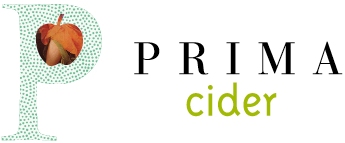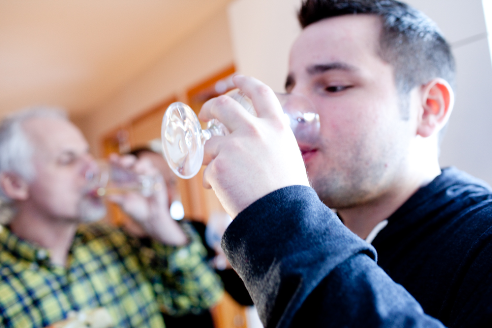As published on www.hogsalt.com
Prima Cider
April 4th, 2012 by Kari Skaflen
For the Bertsches, cider is a long family tradition that began three generations previous with a grandfather who had a propensity for good German cider.
In recent years cider has become an even larger part of family life— Patriarch, Richard Bertsche; and his three sons: Erich, Tristan and Martin; along with nephew, Carl Maier, are making noteworthy ciders themselves. Their locally sourced, small batch artisan cider, Prima Cider, has been turning up in some of the best restaurants and shops in town.
Prima Cider currently offers two styles of cider: Most, a simpler, farmhouse-style cold cider; and Brut, which is the Champagne-style sparkling cider, perhaps more common to the American palate. Beginning with the playful label, it’s clear that Prima Cider is going to be fun. From the initial sip, to the bottom of the glass, the ciders are easy to drink, and surprisingly different, challenging notions that ciders are over-carbonated apple juice.
We caught up with the Bertsches at their Long Grove home, where we were lucky enough to sit in on a family cider tasting (and traditional German bread making in a stone oven)! For our visit, the Bertsches assembled a collection of ciders from across the country to taste and compare. Not only did sitting in on the tasting prove educational, (who knew that there were so many varieties of apples?— or that many of the tart cider-making apples had been wiped out during prohibition?). It was also an opportunity to witness the family’s dedication to the quality of their ciders as well as their commitment to keeping the process enjoyable.
So how did you guys get into making cider, why not start with the more ubiquitous beer?
Richard:
Personally, I always liked cider, it was a way to continue a tradition. I made my own cider because you just couldn’t purchase cider 30 years ago. It then became my hobby that over time became serious.
Erich:
When I was in high school I was lucky enough to spend a summer in Germany working in a very good friends bakery. He had two huge wooden barrels full of cider in his cellar which he would produce every year. There was nothing better than drinking a freshly poured glass of cider from his cellar. I’ve been hooked ever since.
Tristan:
Cider was the drink of choice for many of the local farmers in the small town our grandfather came from. So when he “jumped the pond” and settled in Long Grove, it was something he had a natural taste for, but couldn’t find in the grocery stores.
Tell us a bit more about the process of making cider? How do you source your apples, for example?
Richard:
Cider is made like wine. It is a simpler process than beer making, requires less equipment/technology and is governed more by the quality of ingredients (it’s all about the apples) than by technology and chemistry. Our cider is sourced from local orchards. The apple varieties are heirloom or heritage apples (sometimes also referred to as antique apples or common apples). Common apples are apple varieties that were commonly planted in the U.S. before prohibition. During and after prohibition the common apple orchard trees were replaced with dessert apples. Dessert apples in general are unsuitable for high quality cider. We use a number of different apple varieties looking for bitter, bitter-sweet, sweet and sharp varieties; Heirloom examples include: Golden Russet, Winesap, Arkansas Black, Brambleys Seedling, Roxbury Russet, Northern Spy, Belle De Boskoop, Black Twig, Limbertwig, and Clovis Spice.
What’s up with the name, Prima Cider?
Richard:
Our style of cider has German underpinnings that we wanted to convey. When the Germans say something tastes ‘Prima’ they mean it tastes very good; it hits the spot. So ‘Prima’ seemed to work nicely.
That’s quite a playful label on the Prima Cider what’s the story behind that?
Erich:
The label was a ton of fun for us. It began in Northern Italy where my wife grew up. We toured a winery owned by one of her friends who had an amazing set up. I thought his labels were very simple but impressive, and was able to get in touch with the same designer. It was important to us to work a family concept into the label while this endeavor is really a family affair. Hence you will always find a core group of playful figures somewhere on the label.
Tristan:
We wanted something to show the joy of cider making that we all share.
Why did you all decide to make it a family business? Do you each have specific strengths that you bring to the table?
Richard:
We all like cider and it seemed natural, like the only way to do it. As a small craft ciderey it takes a lot of work. Pressing, racking, bottling, labeling, it all takes a lot of time and effort. It helps to have family who you can count on.
Tristan:
Cider has been a part of our family for many years. My dad [also] has a great passion for creating his own things. It’s what drives him to do great things, whether it’s making state of the art machines or hand crafted cider. There’s a great sense of purpose to create something out of nothing and bring it into the world.
Who is the tastemaker in the family? Is it a democracy?
Richard:
Sometimes it’s a benevolent dictatorship (occasionally worse) but usually a democracy. Currently I’m the tastemaker but this year Carl has been using his experience with beer brewing, and experimenting with different variations of yeast and different styles of fermentation. The results are varieties that we will offer as Prima Saison and Prima Hefe next year.
What’s one of the biggest misnomers about cider?
Richard:
The biggest misnomer is probably that cider has to be sweet, carbonated and taste like apples. As a good friend of mine put it, “I always thought commercial ciders tasted like carbonated apple juice made from concentrate.”
But the example I like to use is : Does a good wine tastes like grapes? Usually not. Then why does a cider have to taste like apples?
Erich:
I think one of the biggest misnomers is that cider is a summer drink. Yes, cider tastes great in summer, so does beer, and cider can be enjoyed all year long— just like beer.
So, I want a glass of Prima Cider, where can I find it?
Tristan:
Right now it’s in some of our favorite restaurants and bars, and in a few retail locations:
Owen & Engine
Farmhouse Chicago
Red & White Wines Chicago
West Lakeview Liquors

